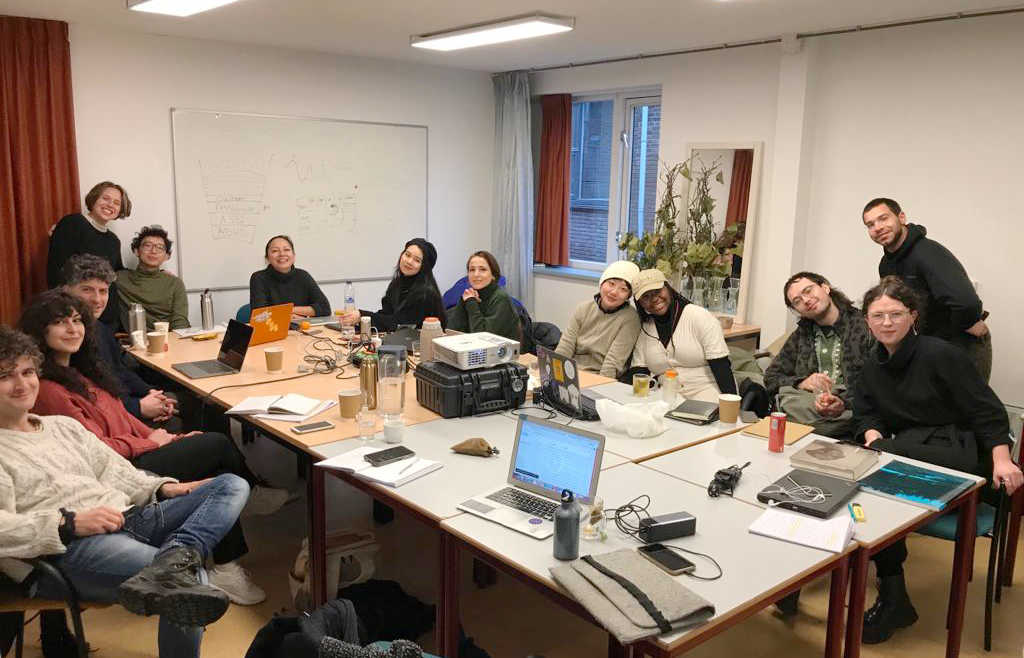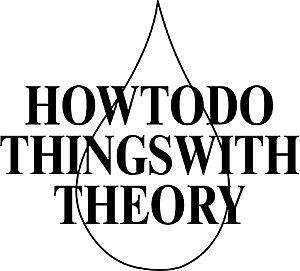On Not S(t)aying the Same ~ From Month to Month
Seminar 5 & 6 (May 2023) on Salina, Italy
During our last seminar we thought hard about what the term “freedom” signifies and problematized the ways freedom is cognitively ascertained and materially possessed in opposition to conditions of unfreedom, i.e. under and within a systemic regime of exchange. For our final double seminar that takes course over four days we will continue our critical engagement with the ways, and the whys, we say things, and what we (think we) mean and expect when we say them. In other words, we have been philosophically and materially troubling concepts as they are used in “truth” procedures. We continue our investigations by now turning towards the sign “world.” Our readings include essays in Harney and Moten’s All Incomplete, Povinelli’s Routes/Worlds, and Marcus Boon’s The Politics of Vibration: Music as a Cosmopolitical Practice. Harney and Moten guide us in thinking through the differences between earth and world: “the earth moves against the world”; the question of means and ends (logistics, individuation), and the commitment to incompletion and partiality in the face of metaphysically globalized exceptionalisms. In turn, Povinelli guides us through late liberalism’s creation and dismantling of worlds “formed by the twinning of historical progress and settler colonialism” and the transformation of space and time by nation-states and corporations. Povinelli’s invaluable work emphasizes social distribution, the secretions and sedimentations of power, and material matters “without falling back into the metaphysics of substance.” Finally, Marcus Boon’s book studies the cosmopolitical implications of sound, music and vibration. “Music, it turns out, is cosmopolitical: it participates, actively or passively, in a worlding—the constellation or construction of a cosmos or an ontology. And this worlding involves a set of ideological restrictions that in turn shapes and orders the object that we call music, and our implication in it.” Boon analyzes how reality, the world, is organized by way of music’s social and racial significances. Studying vibration’s fields, waves, particles, frequencies, temporalities, we will ask whether Boon’s thinking through vibration as ontological matter is a generative contradiction or a problematic reduction of physics to metaphysics. We end with the chapter “Slowed and Throwed: DJ Screw and the Decolonization of Time” so as to slow down, screw the screwed up world.
Readings:
Marcus Boon. The Politics of Vibration: Music as Cosmopolitical Practice. Durham, NC: Duke University Press, 2022.
Stefano Harney and Fred Moten. All Incomplete. Minor Compositions, 2021
Elizabeth A. Povinelli. Routes/Worlds. Berlin: Sternberg Press, 2022.
Seminar 4 (April 2023) in PAF, St. Erme
From Mathilda’s fugitive escapes to questions of freedom. In Danielle Goldman’s I Want to be Ready: Improvised Dance as a Practice of Freedom, the author argues how practices of improvisation entail a rigorous preparedness for unpredictable and shifting situations. She asks, “who moves? who doesn’t?” and argues that improvisation’s negotiations with constraint defines its political potential. Echoing Mathilda’s moves in Lote, Goldman writes that “improvised dance literally involves giving shape to oneself and deciding how to move in relation to an unsteady landscape,” and is a practice that “involve[s] an on-going stylization of the self where one both respects the constraints of reality and tries to violate them.” Furthermore, Goldman reminds us that the reconciling with, or successful surpassing or resistance, to a set of constraints in effect only leads to another set of new constraints and that improvisation is a constant negotiation “with shifting tight places grounded in the present,” whether created by power relations, social norms, aesthetic traditions, or physical technique.” We will read Goldman in order to attend to improvisations and choreographies in dance and their joining with improvisations and choreographies manifested in life, the “tight spaces” improvisation negotiates with, and the limits of understanding improvisation as mere flight from formal constraint. Goldman proposes that we approach improvisation as incessant preparation, a rigorous training of making oneself ready for a range of potential situations, actions and constraints–improvised dance as politically powerful in its pushing against “static reifications of freedom.”
These questions of constraint and static understandings of freedom are also thought through in Maggie Nelson’s book On Freedom: Four Songs of Care and Constraint. Echoing Goldman, Nelson also seeks to dispel the rhetoric that “condition[s] us into thinking of freedom as a future achievement rather than as an unending present practice.” Focusing on the introduction and essay “Art Song” we will critically engage with, and highlight the insights and the problems that emerge from Nelson’s treatise, as she grapples with the questions of care currently prevalent in art and curatorial practices and discourses.
Readings:
Danielle Goldman. I Want to be Ready: Improvised Dance as a Practice of Freedom. Ann Arbor: University of Michigan Press, 2010.
Maggie Nelson. Introduction and “Art Song.” in On Freedom: Four Songs on Care and Constraint. Minneapolis: Graywolf Press, 2021.
Angela Davis. Freedom is a Constant Struggle. Chicago: Haymarket Books, 2016.
Miss Prissy, The Legendary Pony Zion Garcon, Kia Labeija, and Danielle Goldman. “You’ve Never Seen Pain Expressed like This.” Episode 6: Make a Way Out of No Way. Arika (website), 27 September 2014. https://arika.org.uk/youve-never-seen-pain-expressed/.
Seminar 3 (March 2023) in PAF, St. Erme
For this seminar we are reading Shola von Reinhold’s novel Lote. We follow our investigations on infrastructural critique, the ways language and meaning can also be understood as infrastructures, and the imperative to trouble what they make “common,” by now turning to questions of the historical archive, particularly within dominant art historical traditions, literary canons, and the institutions they make possible and perpetuate by way of reification and erasure. The novel follows the adventures of the fugitive figure of Mathilda (they of many names, spaces and times), their “transfixions,” “escapes,” “luxuries,” as they negotiate the infrastructural political economies and ideological structures of art, archives, thought, discourse, gazes, beauty and pleasure, naming, and whiteness as a racialized class construct.
Readings:
Shola von Reinhold. Lote. London: Jacaranda Books, 2020.
adrienne maree brown. Pleasure Activism: The Politics of Feeling Good. Chico, CA: AK Press, 2019.
Seminar 2 (December 2022 and February 2023) Online
Part 1 (20 December)
Our second seminar online is divided into two parts. In this first part we will discuss the documenta 15 exhibition which too place in Kassel, Germany over the summer of 2022 and was curated (redistributed) by the Jakarta based collective ruangrupa. We will think through the politics of illegibility and question the “common” again by way of the controversies that unfolded and the collective practices that made up the exhibition; collective practices that refused easy representation, “common sense” and exotification by way of precisely the constant and ongoing shifting forms and practices of fugitive collectivity and aesthetic sociality. We will read Brian Massumi’s essay “On the Right to the Non-Communication of Cultural Difference” as an accompaniment to articles reviewing and critically engaging with the exhibition so as to think through matters and forces of incommensurability and inconceivability, and the disciplinary drive to confront such energies via categorical regulation.
Readings:
“The lumbung concept for documenta 15: Statement by ruangrupa from 18 June 2020.” https://universes.art/en/documenta/2022/lumbung.
Paris Lettau, “documenta 15.” MeMO, 16 July, 2022. https://memoreview.net/reviews/documenta-fifteen-by-paris-lettau?fbclid=IwAR0K1nUilhui9HzXaS1NcfbFOl5l05vOx93xpOhW1KKjmDiXG1GgqtPB5Vc.
Goh Sze Ying & Kathy Rowland, “Documenta Fifteen Ends, But the Timeline Continues.” Arts Equator, 26, September 2022. https://artsequator.com/documenta-15-ends-but-the-timeline-continues/.
Lumbung Community, “We Are Angry, We Are Sad, We Are Tired, We Are United: Letter From Lumbung Community.” e-flux-journal, 10 September, 2022.
Brian Massumi, “On the Right to the Non-Communication of Cultural Difference.” In Couplets: Travels in Speculative Pragmatism. Durham, NC: Duke University Press, 2021.
Ana Texeira Pinto “This Is Why We Can’t Have Nice Things!” Journal of Visual Culture, 2022. https://www.journalofvisualculture.org/this-is-why-we-cant-have-nice-things/.
Part 2 (2 February)
The second part of our seminar continues to critically engage with questions of representation, common sense, and infrastructural critique. We will continue to think with documenta 15 via two texts by Marina Vishmidt on the move from institutional critique to infrastructural critique, paying close attention to Vishmidt’s arguments around “infrastructures for life” and “critique as a practice of non-identity.” These readings will be thought with Denise Ferreira da Silva’s essay “Reading Art as Confrontation” where she presents and critically engages with the anticolonial stance of “presenting without representing.” These refusals echo Ocean Vuong’s and Alok Vaid-Menon’s conversation where they discuss the traps of transparency and the refusal of translation, as well as a discussion by two of ruangrupa’s members (Ade Darmawan and farid rakun) on their “art world” experiences and their own emphasis on the “non-representational.” Mirwan Andan, another member of ruanrupa, will be our guest visitor for our online class.
Readings:
Ocean Vuong & Alok Vaid-Menon, “Interview with Ocean Vuong.” The White Review, 32 (March 2022). https://www.thewhitereview.org/feature/interview-with-ocean-vuong/?fbclid=IwAR2e6xyjYdfWpkt8vNNTywn_pAaXyGFnXcUa1jBbfTPDvhb8Gir4XufAar8.
Ade Darmawan, farid rakun, and Mark Rappolt, “Who’s Exploiting Who: Ruangrupa on Documenta Fifteen.” ArtReview, 26, September, 2022. https://artreview.com/who-is-exploiting-who-ruangrupa-on-documenta-fifteen/.
Denise Ferreira da Silva, “Reading Art as Confrontation.” e-flux journal 65, SUPERCOMMUNITY (may-august 2015). http://worker01.e-flux.com/pdf/supercommunity/article_1283.pdf.
Marina Vishmidt, “Between Not Everything and Not Nothing: Cuts Toward Infrastructural Critique.” In: Maria Hlavajova and Simon Sheikh, eds. Former West: Art and the Contemporary After 1989, 265-269. Cambridge, MA: The MIT Press, 2017.
Marina Vishmidt, “’Only as Self-Relating Negativity’: Infrastructure and Critique.” Journal of Science and Technology of the Arts 13, no. 3 (2021): 13-24.
Seminar 1 (November 2022) in Arnhem
The seminar begins with two texts: Theresa Hak Kung Cha’s DICTEE and JJJJJJerome Ellis’s The Clearing. One of Ellis’s epigraphs in The Clearing cites James C Scott: “Illegibility… has been and remains a reliable source for political autonomy.” Our seminar will sit with the politics of illegibility in both the works of Cha and Ellis so as to think through practices of linguistic, semantic and symbolic distortion, dysfluency, and “debris” as Ocean Vuong describes Cha’s disjointed, anticolonial poetics. The materiality, a dirty materiality, of language and meaning emerges textually, sonically and visually in Cha’s and Ellis’s pieces. What can the temporal, spatial, historical, and canonical and colonial breakdowns unleashed in both their practices, through which are expressed forces of syllabic mis- and in-signification as tremoring matter and immanent embodiment, and that defy common sense, tell us about an aesthetics of collective organizing? Can we think of Cha, writing in the early 1980’s and Ellis, in the late 2010’s, as part of a ‘brown commons” as José Muñoz describes it in” Vitalism’s Afterburn: The Sense of Ana Mendieta?” How do Cha, Ellis, and Mendieta form a formless ‘swarm of singularities’ (a swarm of signs, of sounds, of hieroglyphs, of syllables, stones, bodies, and breath) through their different engagements with embodiment, earth, landscape, displacement, recording, sensing, materiality, trace? Guest speaker will be Yen Noh, DAI alum, who will present her recent project on Theresa Hak Yung Cha’s DICTEE at the BAK in class, and we will listen to JJJJJerome Ellis’s music and a podcast interview. Finally, we will watch Wu Tsang’s film One Emerging from a Point of View, so as to think through entanglement, the chthonic, histories of migration, interweaving melismatic narratives and space-time continuums. Overall, the seminar’s concerns are, to paraphrase Kamau Brathwaite, the (pre)voicings of the torn and new out of a stammering world.
Readings:
Theresa Hak Yung Cha, DICTEE. Berkeley: University of California Press, 2001 [1982].
JJJJJerome Ellis, The Clearing. Brooklyn, NY: Wendy’s Subway, 2021.
JJJJJerome Ellis, “Preface or Prevoice or Melismatic Palimpsest.” In The Clearing. Brooklyn, NY: Wendy’s Subway, 2021.
José Esteban Muñoz, “Vitalism’s Afterburn: The Sense of Ana Mendieta.” Women & Performance: a journal of feminist theory 21, no. 2 (July 2011).
Podcast: Jerome Ellis, (with Sean Cole), “Time Bandit.” This American Life. 2020.
Film: Wu Tsang (director), One Emerging from a Point of View, 2019.


